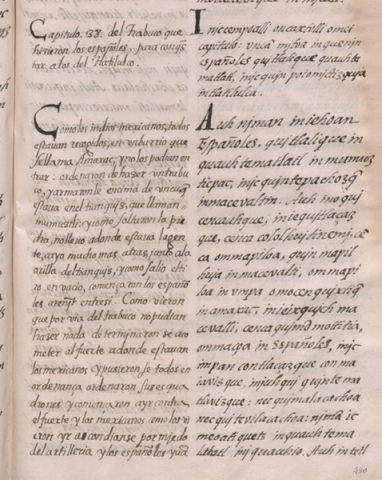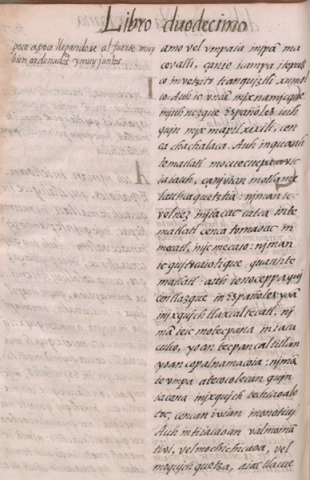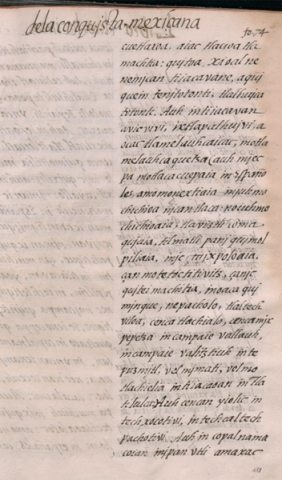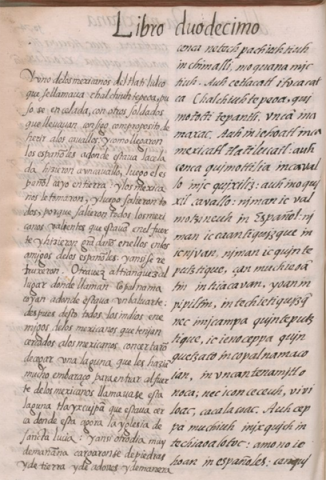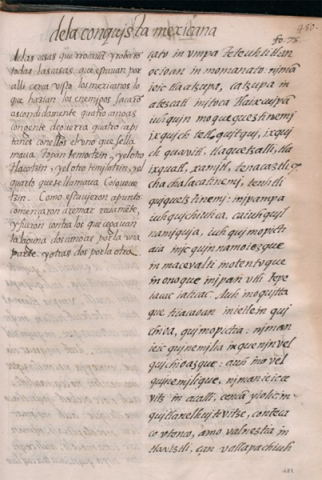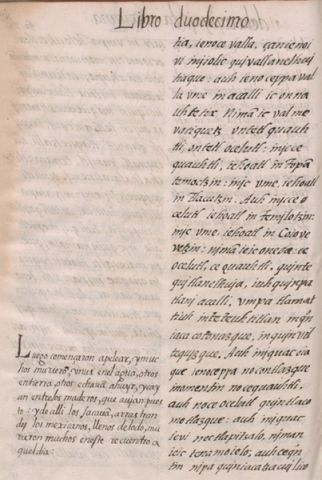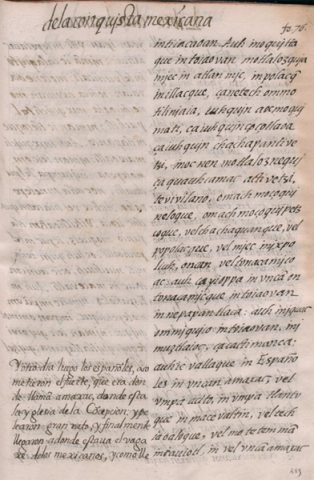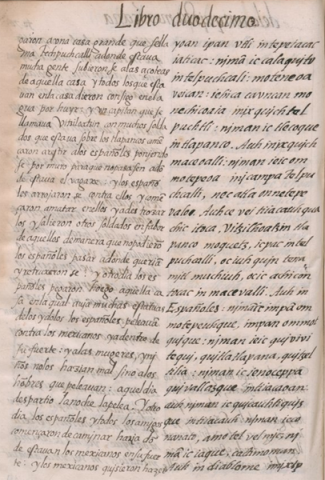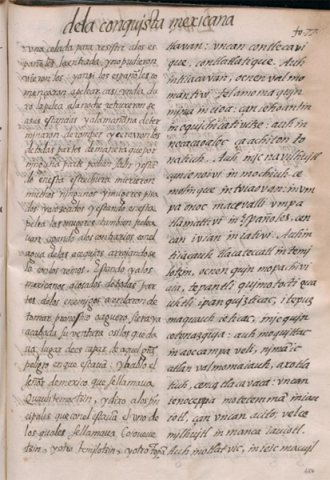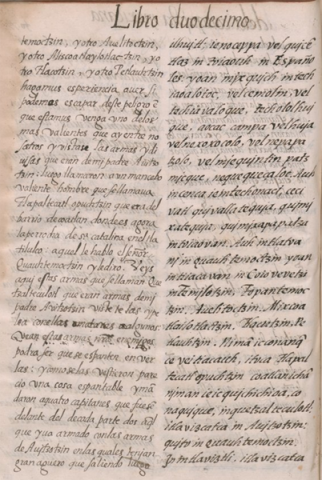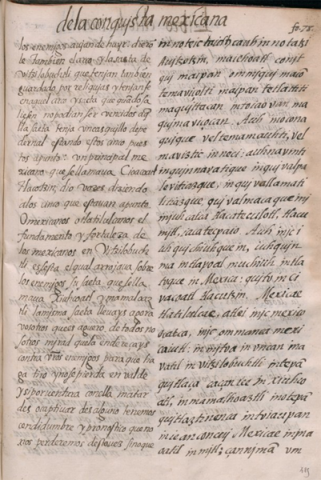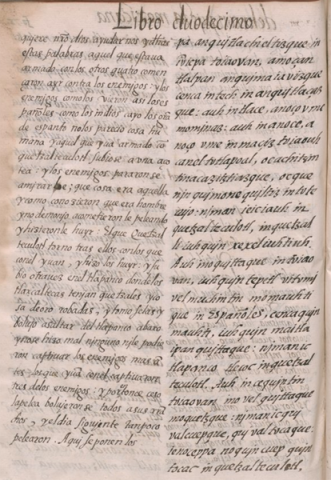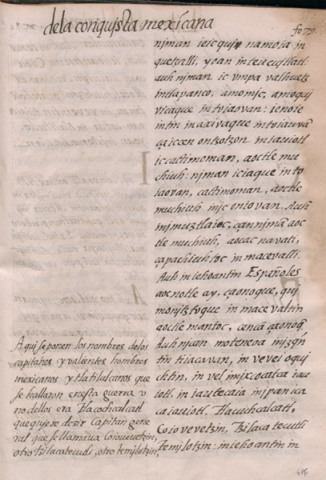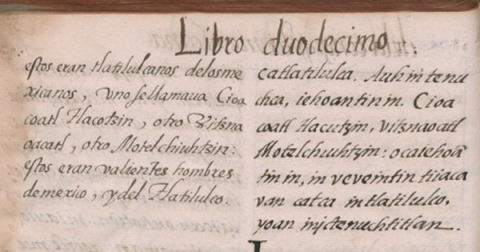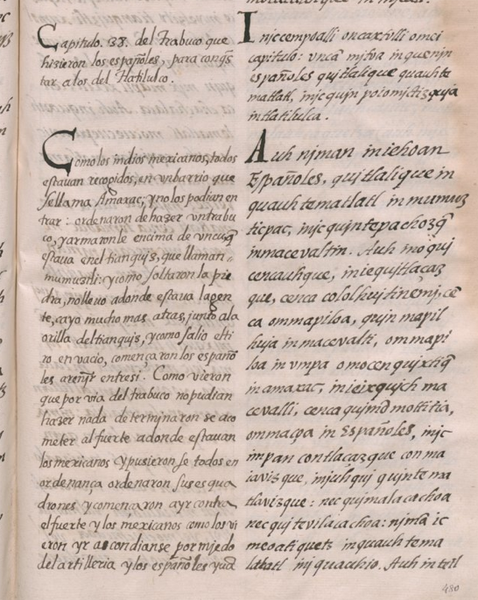 |
[Transcription of the Nahuatl (right-hand column) by James Lockhart:]
[f. 73r.] Inic cempoalli oncaxtolli omei capitulo: vncā mitoa in quenin españoles quitlalique quauhtematlatl, inic quinpoiomictizquia in tlatilulca.
Auh niman in iehoan Españoles, quitlalique in quauhtematlatl in mumuzticpac, inic quintepachozq̄ in macevaltin. Auh in oquicencauhque, in ie quitlaçazque, cenca cololhuitinemi, cēca ommapiloa, quinmapilhuia in macevalti, ommapiloa in vmpa omocenquixtiq̄ in amaxac, in ie ixquich macevalli, cenca quimōmottitia, ommaçoa in Españoles, inic impan contlaçazque conmaiavizque, in iuhqui quintematlavizque: nec quimalacachoa nec quitevilacachoa: nimā ic meoatiquetz in quauhtemalacatl in iquauhio. Auh in tetl
|
[Translation of the Nahuatl (right-hand column) by James Lockhart:]
Thirty-eighth chapter, where it is said how the Spaniards installed a catapult with which they were going to kill the Tlatelolca by stealth.
And then those Spaniards installed a catapult on top of an altar platform with which to hurl stones at the people. And when they had it ready and were about to shoot it off, they gathered all around it, vigorously pointing their fingers, pointing at the people, pointing to where all the people were assembled at Amaxac, showing them to each other. The Spaniards spread out their arms, [showing] how they would shoot and hurl it at them, as if they were using a sling on them. Then they wound it up, then the arm of the catapult rose up. But the stone
[Translation of the Spanish (left-hand column) by James Lockhart:]
Chapter Thirty-eight, of the catapult that the Spaniards made to conquer the Tlatelolca.
When the Mexica Indians had all taken refuge in a district called Amaxac and they could not get at them, they ordered a catapult to be built and set it up on top of a cu that was in the tiánquiz, called a momoztli. When they launched a stone, it did not land where the people were but fell much farther back, next to the edge of the tiánquiz.
As the shot hit nothing, the Spaniards began to argue among themselves. When they saw that they could achieve nothing by means of the catapult, they decided to attack the stronghold where the Mexica were. They put themselves in proper order, arranging their squadrons, and began to move against the stronghold. When they saw them coming, the Mexica hid themselves for fear of the artillery, and the Spaniards
|
[Translation of the Nahuatl into Spanish by Fr. Bernardino de Sahagún; transcription of the Spanish (left-hand column) by James Lockhart:]
[f. 73r.] Capitulo .38. del trabuco que hizieron los españoles, para conq̓star a los Tlatilulco.
Como los indios mexicanos, todos estauan recogidos, en vn barrio que se llama Amaxac; y no los podian entrar: ordenaron de hazer vn trabuco, y armaronle encima de vn cu, q̄ estaua en el tianquiz, que llaman mumuztli:* y como soltaron la piedra, no lleuo adonde estaua la gente, cayo mucho mas atras, junto a la orilla del tianquiz,
y como salio el tiro en vacio, començaron los españoles a reñir entre si.
Como vieron que por via del trabuco no pudian hazer nada determinaronse acometer al fuerte adonde estauan los mexicanos y pusieronse todos en ordenança ordenaron sus esquadrones y començaron a yr contra el fuerte y los mexicanos como los vieron yr ascondianse por miedo del artilleria y los españoles yuā
----------
*MUMUZTLI. Momoztli was a generic term for a sacrifcial platform or altar. It is not entirely clear, however, that Sahagún does not (mistakenly) intend the word as the temple's proper name, as he apparently did with the locative form of the name of fol. 66v.
|
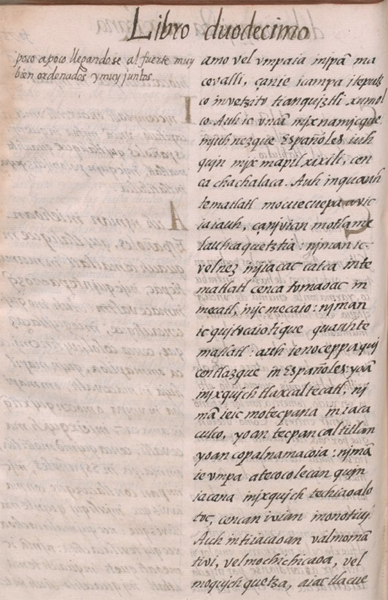 |
[Transcription of the Nahuatl (right-hand column) by James Lockhart:]
[f. 73v.] amo vel vmpa ia in ipā macevalli, çan ie icampa iteputzco in vetzito tianquiztli xumolco.
Auh ic vncā mixnamicque in iuh nezque Españoles iuhquin mixmapilxixili, cenca chachalaca. Auh in quauhtematlatl mocuecuepa avic iaiauh, çan ivian motlamelauhcaquetztia: niman ic vel nez in iiacac catca in tematlatl cenca tomaoac in mecatl, inic mecaio: niman ic quitocaiotique quauhtematlatl:
auh ie no ceppa quicentlazque in Españoles: yoā in ixquich tlaxcaltecatl, nimā ie ic motecpana in iacaculco, yoan tecpancaltitlan yoan copalnamacoia: nimā ie vmpa atecocolecan quiniacana in ixquich techiaoalotoc, cencan ivian in onotiui. Auh in tiiacaoan valmomātivi, vel mochichicaoa, vel moquichquetza, aiac tlacue
|
[Translation of the Nahuatl (right-hand column) by James Lockhart:]
did not land on the people, but fell behind the marketplace at Xomolco.
Because of that the Spaniards there argued among themselves. They looked as if they were jabbing their fingers in each other’s faces, chattering a great deal. And the catapult kept returning back and forth, going one way and then the other; bit by bit it righted itself. Then it could be seen clearly that there was a stone sling at its point, attached with very thick rope. Then because of that they named it a “wooden sling.”
And again they sent out the Spaniards and all the Tlaxcalans. Then they formed up at Yacacolco, Tecpancaltitlan, and Copalnamacoyan. Then at Ateccolecan [the Spaniards] led all those who surrounded us; very slowly they proceeded. And the [Mexica] warriors came in formation, working up their spirits, taking a manly posture; no one was
[Translation of the Spanish (left-hand column) by James Lockhart:]
went along bit by bit, in very good order and closely spaced, approaching the stronghold.
|
[Translation of the Nahuatl into Spanish by Fr. Bernardino de Sahagún; transcription of the Spanish (left-hand column) by James Lockhart:]
[f. 73v.] poco a poco llegandose al fuerte muy bien ordenados y muy juntos.
|
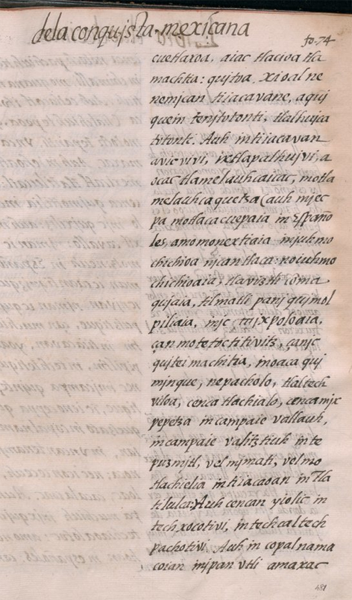 |
[Transcription of the Nahuatl (right-hand column) by James Lockhart:]
[f. 74r.] cuetlaxoa, aiac tlacioatlamachtia: quitoa. Xioalnenemican tiiacavane, aquique in tenitotonti, tlalhuicatotonti. Auh in tiiacavan avic vivi, ixtlapalhuivi, aocac tlamelauhca icac, motlamelauhcaquetza
(auh miecpa motlacacuepaia in Españoles, amo monextiaia in iuh mochichioa nican tlaca: no iuh mochichioaia, tlaviztli cōmaquiaia, tilmatli pani quimolpiliaia, inic mixpoloaia, çan motetoctitivitz, çan ic quiteimachitia, in o aca quiminque, nepacholo, tlaltech viloa, cenca tlachialo, cenca mixpepetza* in campa ie vallauh, in campa ie valitztiuh in tepuzmitl, vel mimati, vel motlachielia in tiiacaoan in Tlatilulca:)
Auh cencan yiolic in techxocotivi, in techcaltechpachotivi. Auh in copalnamacoian in ipan vtli amaxac
----------
*MIXPEPETZA. Possibly the intention is "mixpepetzoa."
|
[Translation of the Nahuatl (right-hand column) by James Lockhart:]
faint of heart, no one was like a woman. They said, “Come running, oh warriors! Who are these little barbarians, these little backlanders?” And the warriors went this way and that, sideways; no one stood straight, raised up straight.
(And often the Spaniards changed their appearance, not showing themselves. They got themselves up as the local people do, putting on devices, tying cloaks on to disguise themselves, hiding behind the others. The only way they could be recognized was when they shot someone. Then everyone crouched down and hit the ground; everyone looked and searched closely to see where the iron bolt came from, which way it was aimed. The Tlatelolca warriors were very alert, kept very good watch.)
Very slowly they went along throwing us back, pushing us against the wall. And at Copalnamacoyan, on the Amaxac road,
[Translation of the Spanish (left-hand column) by James Lockhart:]
(intentionally blank)
|
[Translation of the Nahuatl into Spanish by Fr. Bernardino de Sahagún; transcription of the Spanish (left-hand column) by James Lockhart:]
[f. 74r.; sin dibujos y sin texto en español]
|
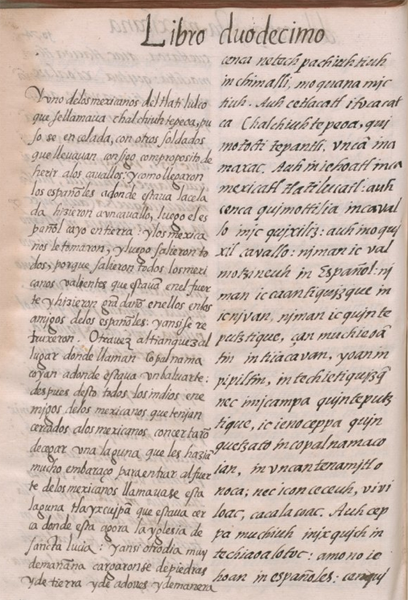 |
[Transcription of the Nahuatl (right-hand column) by James Lockhart:]
[f. 74v.] cenca netech pachiuhtiuh in chimalli, moquanamictiuh.
Auh ce tlacatl itoca catca Chalchiuhtepeoa, quimotocti tepantli, vncā in amaxac. Auh in iehoatl in ca mexicatl tlatilucatl:* auh cenca quimottilia in cavallo inic quixiliz: auh in oquixil cavallo: niman ic valmotzineuh in Español: niman ic caantiquizque in icnivan, niman ic quinteputztique, çan much ieoātin in tiiacavan, yoan in pipiltin, intech ietiquizq̄ nec imicampa quinteputztique, ic ie no ceppa quinquetzato in copalnamacoian, in vncan tenamitl onoca: nec ic onceceuh, viviloac, cacalacoac.
Auh ceppa muchiuh in ixquich in techiaoalotoc: amo no iehoan in españoles: cenqui
----------
*TLATILUCATL. Read "tlatilulcatl."
|
[Translation of the Nahuatl (right-hand column) by James Lockhart:]
the weapons clashed against each other, there was a head-on encounter.
And in Amaxac a person whose name was Chalchiuhtepehua took shelter behind a wall. He was one of the Mexica from Tlatelolco. He looked closely at a horse in order to spear it, and when he speared it, the Spaniard was unhorsed. Then his companions quickly seized him. Then all the warriors and noblemen went after them, keeping close to them and following behind them. They forced them back again to Copalnamacoyan, where the wall stood. Then the fighting paused; everyone went away and entered his quarters.
Once it happened that all those who were surrounding us, not including the Spaniards, went and assembled
[Translation of the Spanish (left-hand column) by James Lockhart:]
One of the Mexica of Tlatelolco, called Chalchiuhtepehua, laid an ambush, together with other soldiers he had with him, with the intention of wounding the horses. When the Spaniards reached the place of the ambush, they wounded a horse; then the Spaniard fell to the ground, and the Mexica captured him. Then they all sallied forth, for all the brave Mexica who were in the stronghold came out, and they inflicted great damage on the Spaniards and their friends, and thus they withdrew again to the tiánquiz, to the place called Copalnamacoyan, where there was a bulwark.
After this all the Indians who were enemies of the Mexica and who had the Mexica besieged agreed to fill up a lake that was greatly impeding their access to the stronghold of the Mexica. This lake was called Tlaixcuipan and was close to where the church of Santa Lucia is now. Thus the next day very early in the morning they loaded themselves up with stones, earth, adobe bricks, and wood
|
[Translation of the Nahuatl into Spanish by Fr. Bernardino de Sahagún; transcription of the Spanish (left-hand column) by James Lockhart:]
[f. 74v.] Y vno de los mexicanos del tlatilulco que se llamaua chalchiuhtepeoa, pusose en celada, con otros soldados que lleuauan consigo com proposito de herir a los cauallos: y como llegaron los españoles adonde estaua la celada hizieron* a vn cauallo, luego el español cayo en tierra: y los mexicanos le tomaron, y luego salieron todos, porque salieron todos los mexicanos valientes que estauā en el fuerte y hizieron grā daño en ellos en los amigos de los españoles: y ansi se retruxeron. Otra uez al tianquez al lugar donde llaman Copalnamacoyan adonde estaua vn baluarte:
despues desto todos los indios enemigos de los mexicanos que tenian cercados a los mexicanos concertarō de cegar vna laguna que les haziā mucho embaraço para entrar al fuerte de los mexicanos llamauase esta laguna tlayxcuipā que estaua cerca donde esta agora la yglesia de sancta lucia: y ansi otro dia muy de mañana cargaronse de piedras y de tierra y de adoues y de manera**
----------
*HIZIERON. For "hirieron."
**MANERA. For "madera."
|
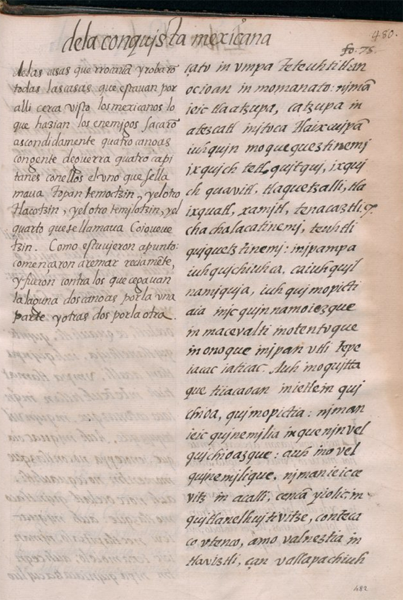 |
[Transcription of the Nahuatl (right-hand column) by James Lockhart:]
[f. 75r.] çato in vmpa Teteuhtitlan oc ioan in momanato: nimā ie ic tlaatzupa, catzupa in atezcatl in itoca Tlaixcuipā iuhquin moquequeztinemi ixquich tetl quitqui, ixquich quavitl, tlaquetzalli, tlaixquatl, xamitl, tenacaztli .&. chachalacatinemi, teuhtli quiquetztinemi: in ipampa iuh quichiuhca, ca iuh quilnamiquia, iuh quimopictiaia, inic quinnamoiezque in macevalti in otentoque in onoque in ipan vtli tepeiacac iaticac.
Auh in oquittaque tiiacaoan in ie tlein quichioa, quimopictia: niman ie ic quinemilia in quenin vel quichioazque: auh in o vel quinemilique, niman ie ic ce vitz in acalli, cencā yiolic, in quitlanelhuitivitze, contecaco vtenco, amo valneztia in tlaviztli, çan vallapachiuh
|
[Translation of the Nahuatl (right-hand column) by James Lockhart:]
at Teteuhtitlan; it was still dark when they took position. Then they began filling in the waters, filling in a small lake called Tlaixcuipan. They seemed to go jostling each other, some carrying stone, some wood, pillars, door lintels, adobes, corner stones, etc. They went about chattering, raising the dust. The reason they did it was that it occurred to them and they imagined that they would plunder the common people who lived beside the road going to Tepeyacac.
And when the [Mexica] warriors saw what they were doing and what their intention was, they considered what they could do. And when they considered well, a boat was brought; they came poling it very slowly, stationing it at the side of the road. No warrior’s device could be seen; everything was just covered over.
[Translation of the Spanish (left-hand column) by James Lockhart:]
from the houses they had demolished, and they robbed all the houses that were in that vicinity.
When the Mexica saw what the enemy was doing, they secredy got out four canoes full of warriors under four captains, one of whom was called Topantemoctzin, another Tlacotzin, another Temilotzin, and the fourth Coyohuehuetzin. When they were ready, they began to paddle [pole] with vigor, and with two canoes on one side, and the other two on the other, they went against, those who were filling in the lake.
|
[Translation of the Nahuatl into Spanish by Fr. Bernardino de Sahagún; transcription of the Spanish (left-hand column) by James Lockhart:]
[f. 75r.] de las casas que rrocauā* y robarō todas las casas que estauan por alli cerca
visto los mexicanos lo que hazia los enemigos sacarō ascondidamente quatro canoas con gente de guerra quatro capitanes con ellos el vno que se llamaua Topantemoctzin, y el otro Tlacotzin, y el otro temilotzin, y el quarto que se llamaua Coioueuetzin. Como estuuieron a punto: començaron a remar reciamēte, y fueron contra los que cegauan la laguna dos canoas por la vna parte y otras dos por la otra.
----------
*RROCAUĀ. For "derrocauā."
|
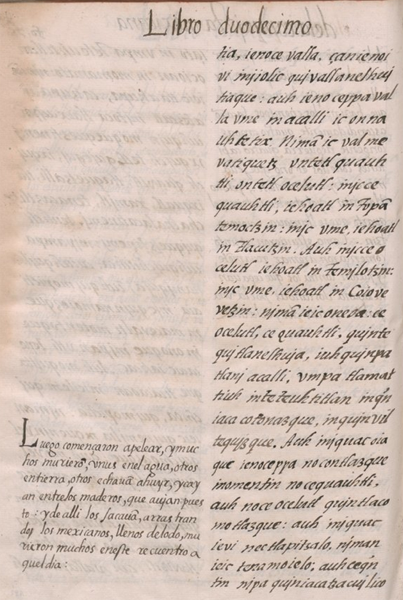 |
[Transcription of the Nahuatl (right-hand column) by James Lockhart:]
[f. 75v.] tia, ie no ce valla, çan ie no ivi in iiolic quivallanelhuitiaque: auh ie no ceppa valla vme in acalli ic onnauhtetix. Nimā ic valmevatiquetz vntetl quauhtli, ontetl ocelutl: inic ce quauhtli, iehoatl in Topātemoctzin: inic vme, iehoatl in Tlacutzin. Auh inic ce ocelutl iehoatl in Temilotzin: inic vme, iehoatl in Coiovevetzin: nimā ie ic oneoa: ce ocelutl, ce quauhtli, quintequitlanelhuia, iuhquin patlani acalli, vmpa tlamattiuh in teteuhtitlan in q̄niacacotonazque, in quinviltequizque. Auh in iquac oiaque ie no ceppa no contlazque in omentin no ce quauhtli, auh no ce ocelutl quintlacomotlazque: auh in iquac ie vi nec tlapitzalo, niman ie ic tenamoielo: auh ceq̄ntin nipa quiniacatzacuilico
|
[Translation of the Nahuatl (right-hand column) by James Lockhart:]
Then another was brought; they came poling it slowly in the same way, and again two more boats were brought, making four. Then two eagle [warriors] and two jaguar [warriors] rose up. The first eagle was Topantemoctzin and the second Tlacotzin. The first jaguar was Temilotzin, and the second Coyohuehuetzin. Then they got started. They vigorously poled one jaguar and one eagle. The boats seemed to fly, heading for Teteuhtitlan to cut them off, to head them off. And when they had gone, again they dispatched two, also one eagle and one jaguar, to throw themselves into their midst. And when they went, wind instruments were played. Then people were plundered, but the warriors cut off some [of the enemy] on the other side.
[Translation of the Spanish (left-hand column) by James Lockhart:]
Then they began the battle, and many died, some in the water, some on land. Others started to flee and fell between the timbers that they had put in place. The Mexica dragged them from there, full of mud. Many died in the encounter of that day.
|
[Translation of the Nahuatl into Spanish by Fr. Bernardino de Sahagún; transcription of the Spanish (left-hand column) by James Lockhart:]
[f. 75v.] Luego començaron a pelear, y muchos murierō, vnus en el agua, otros en tierra, otros echauā a huyr, y cayan entre los maderos, que auian puesto: y de alli los sacauā, arrastrando los mexicanos, llenos de lodo, murieron muchos en este recuentro aquel dia:
|
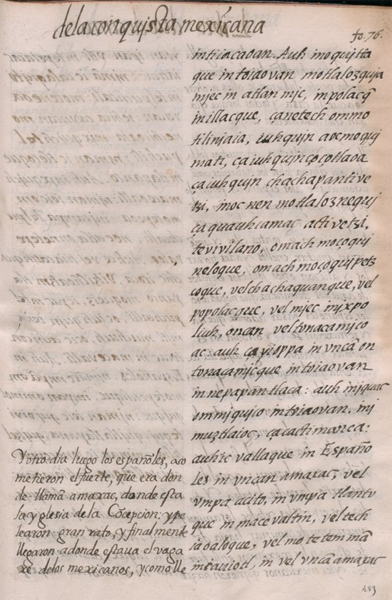 |
[Transcription of the Nahuatl (right-hand column) by James Lockhart:]
[f. 76r.] in tiiacaoan.
Auh in oquittaque in toiaovan motlalozquia miec in atlan mic, in polacq̄ in illacque, ça netech ommotiliniaia, iuhquin aocmo quimati, ça iuhquin çoçotlaoa ça iuhquin chachapantivetzi, in oc nen motlaloznequi ça quauhcamac activetzi, tevivilano, omach moçoquineloque, omach moçoquipetzcoque, vel chachaquanque, vel popolacque, vel miec in ixpoliuh, oncan vel tonacamicoac: auh çayioppa in vncā ontonacamicque in toiaovan in nepapan tlaca: auh in iquac ommiquico in toiaovan, in imuztlaioc, ça cactimanca:
auh ic vallaque in Españoles in vncan amaxac, vel vmpa acito, in vmpa tlantoque in macevaltin, vel techiaoaloque, vel motetemmā in iauiotl, in vel vncā amaxac
|
[Translation of the Nahuatl (right-hand column) by James Lockhart:]
When our enemies saw this, they tried to flee. Many died in the water, sinking and submerging, just pulling at each other, as though they had lost their senses and were fainting. They seemed to fall splattering; when they tried to flee they just fell between the logs. When they were dragged out they were completely covered with mud, slimy with mud, entirely drowned. A great many perished, there was a great abundance of deaths. This was the only time that the different [local] people who were our enemies died in great numbers there. And the day after our enemies had died, everything lay silent.
And at this time the Spaniards came to Amaxac; they reached the very place where the common people lay in extremity. They fully surrounded us, and there was fierce battle, right in Amaxac
[Translation of the Spanish (left-hand column) by James Lockhart:]
Then the next day the Spaniards attacked the stronghold, at the place they call Amaxac, where the church of Concepción is, and they fought for a long while, until finally they reached the place where the Mexica's baggage was. When
|
[Translation of the Nahuatl into Spanish by Fr. Bernardino de Sahagún; transcription of the Spanish (left-hand column) by James Lockhart:]
[f. 76r.] Y otro dia luego los españoles, acometieron el fuerte, que era donde llamā amaxac, donde esta la yglesia de la Cōcepcion: y pelearon gran rato, y finalmente llegaron adonde estaua el vagaxe de los mexicanos, y como lle
|
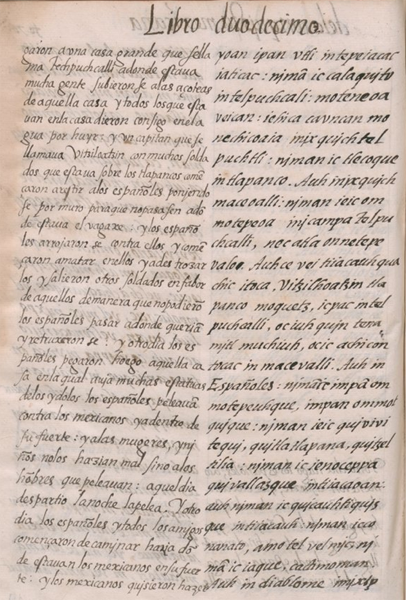 |
[Transcription of the Nahuatl (right-hand column) by James Lockhart:]
[f. 76v.] yoan ipan vtli in tepeiacac iaticac: nimā ic calaquito in telpuchcali:* moteneoa veican: iehica ca vncan monechicoaia in ixquich telpuchtli: niman ic tlecoque in tlapanco. Auh in ixquich maceoalli: niman ie ic ommotepeoa in icampa Telpuchcalli, nec atla onnetepevalo. Auh ce vei tiiacauh quachic itoca, Vitzilhoatzin tlapanco moquetz, icpac in telpuchcalli, oc iuhquin tenamitl muchiuh, oc ic achi contocac in macevalli. Auh in Españoles: nimā ic impā ommotepeuhque, impan ommotquique: niman ie ic quivivitequi, quitlatlapana, quitzeltilia: niman ic ie no ceppa quivallazque in tiiacaoan: auh niman ic quicauhtiquizque in tiiacauh: niman ic conanato, amo tel vel mic, nimā ic iaque, cactimoman.
Auh in diablome imixip
----------
*TELPUCHCALI. See fols. 27v., 34v., and 39v. above.
|
[Translation of the Nahuatl (right-hand column) by James Lockhart:]
and on the road going to Tepeyacac. Then [the Spaniards] went into the youths’ house called Hueican, because all the youths were gathered there, and then they climbed up to the roof. And then all the common people scattered behind the youths’ house; then everyone scattered into the water. And one great warrior, a scraped-head named Huitzilhuatzin, stood up on the roof above the youths’ house. He was like a bulwark, and the people followed him for a little while. But then the Spaniards fell upon them, and they struck him, breaking him apart, cutting him to pieces. Then [the Mexica] let loose with the warriors again and made them let go of the warrior [Huitzilhuatzin]. Then they took him; he was not quite dead. Then they went away, and there was silence.
Then [the Spaniards] set fire to and burned the images of devils there.
[Translation of the Spanish (left-hand column) by James Lockhart:]
they reached a large house called a telpochcalli, where there were many people, they climbed up on the roof terraces of that house, and all who were inside the house threw themselves into the water to get away. A captain called Huitzilhuatzin, with many soldiers who were on the tlapancos, began to resist the Spaniards, making of themselves a barrier so they could not get to where the baggage was. The Spaniards hurled themselves upon them and began to kill some of them and destroy them, but other soldiers sallied forth in their favor, so that the Spaniards could not get where they wanted to, and withdrew.
The next day the Spaniards set fire to that house, in which there were many statues of idols. The Spaniards were now battling against the Mexica inside their stronghold. They did no harm to the women and children, but only to the men who were fighting. That day night put an end to the battle.
The next day the Spaniards and all their friends began to move toward where the Mexica were in their stronghold. The Mexica tried to make
|
[Translation of the Nahuatl into Spanish by Fr. Bernardino de Sahagún; transcription of the Spanish (left-hand column) by James Lockhart:]
[f. 76v.] garon a vna casa grande que se llama Techpuchcalli* adonde estaua mucha gente subieronse a los açoteas de aquella casa y todos los que estauan en la casa dieron consigo en el agua por huyr: y vn capitan que se llamaua Vitziloatzin con muchos soldados que estaua sobre los tlapancos comēçaron a restir** a los españoles poniendose por muro para que no pasasen adōde estaua el vagaxe: y los españoles arrojaronse contra ellos y comēçaron a matar en ellos y a destrozarlos y salieron otros soldados en fabor de aquellos de manera que no podierō los españoles pasar adonde queriā y retruxeronse:
y otro dia los españoles pegaron hoego aquello casa en la qual auia muchas estatuas de los ydolos los españoles peleauā contra los mexicanos ya dentro de su fuerte: y a las mugeres, y niños no los hazian mal sino a los hōbres que peleauan: aquel dia despartio la noche la pelea.
Y otro dia los españoles y todos los amigos començaron de*** caminar hazia dōde estauan los mexicanos en su fuerte: y los mexicanos quiseron hazer
----------
*TECHPUCHCALLI. For "Telpuchcalli."
**RESTIR. For "resistir."
***DE. Normal usage demands "a."
|
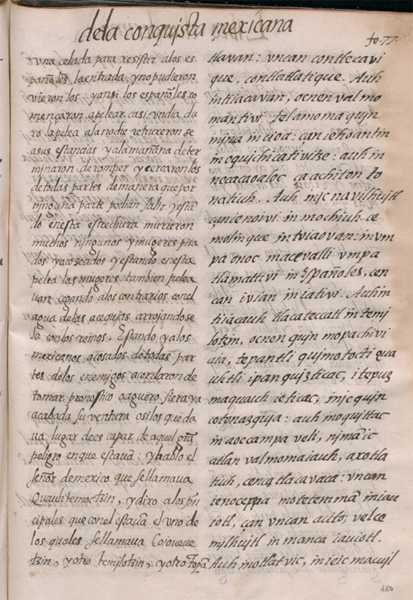 |
[Transcription of the Nahuatl (right-hand column) by James Lockhart:]
[f. 77r.] tlavan: vncan contlecavique, contlatlatique. Auh in tiiacavan, oc nen valmomantivi. tel amo ma quinmina in cioa: çan iehoantin in oquichicativitze:* auh in necacaoaloc ça achiton tonatiuh.
Auh inic navilhuitl çan ie no ivi in mochiuh cemolinque in toiaovan: in vmpa onoc macevalli vmpa tlamattivi in Españoles, cencan ivian in iativi. Auh in tiiacauh Tlacateccatl in Temilotzin, oc nen quinmopachiviaia, tepantli quimotocti Quauhtli ipan quizticac, itepuzmaquauh ieticac, inic quincotonazquia: auh in oquittac in aoccampa veli, nim ic atlan valmomaiauh, axotlatiuh, cenca tlacavaca: vncan ie no ceppa motetemmā in iauiotl, çan vncan acito: vel cemilhuitl in manca iauiotl.
Auh in otlatvic, in ie ic macuil
----------
*OQUICHIICATIVITZE. I remain unsure whether this means men or women fighting like men.
|
[Translation of the Nahuatl (right-hand column) by James Lockhart:]
The warriors still tried to keep in formation. But [the Spaniards] did not shoot the women, only those who came standing up as men. When the fighting stopped, there was only a little sun.
And on the fourth day our enemies moved together in the same way. The Spaniards headed for where the common people were, going very slowly. And a warrior, the Tlacateccatl Temilotzin, tried to spy on them, taking shelter behind a wall. He was dressed as an eagle, and he had an iron sword with which he was going to cut them up. But when he saw that he could do nothing anywhere, he threw himself into the water, ripped into the water. There was a great clamor. Then there was fierce fighting again; it went no further <than Amaxac>. The battle lasted a full day.
And when it dawned on the fifth day,
[Translation of the Spanish (left-hand column) by James Lockhart:]
an ambush to resist the Spaniards' entry, but they were unable to; they were seen, so the Spaniards began the battle. The fighting lasted almost all day; at night they withdrew to their quarters.
In the morning they decided to let loose full force, and they surrounded them on all sides so that they could not get out anywhere. Being so hemmed in, many children and women died, trampled and kicked. Finding themselves in this battle, the women fought too, blinding their enemies with water from the canals, splashing it on them with paddles.
With the Mexica now pressed on all sides by the foe, they agreed to test through prognostication or omens whether their fate were sealed or they still had room to escape from the great danger confronting them. The lord of Mexico, called Quauhtemoctzin, spoke and said to the leaders with him, one of whom was called Coyohuehuetzin, another Temilotzin, another Topantemoctzin, another Ahuelitoctzin, another Mixcoatlailotlactzin, another
|
[Translation of the Nahuatl into Spanish by Fr. Bernardino de Sahagún; transcription of the Spanish (left-hand column) by James Lockhart:]
[f. 77r.] vna celada para resistir a los españoles la entrada y no pudieron vieronlos: y ansi los españoles començaron a pelear casi vn dia duro la pelea a la noche retruxeronse a sus estancias
y a la mañana determinaron de romper y cercaronlos de todas partes de manera que por ninguna parte podian salir y estādo en esta estrechura murieron muchos ningunos* y mugeres pisados y acozeados y estando en esta pelea las mugeres tambien peleauan cegando a los contrarios con el agua de las acequias arrojandosela con los remos.
Estando ya los mexicanos acosados de todas partes de los enemigos acordaron de tomar pronostico o aguero si era ya acabada su ventura o si los quedaua lugar de escapar de aquel grā peligro en que estauā, y hablo el señor de mexico que se llamaua Quauhtemoctzin, y dixo a los ṕncipales que con el estauā el vno de los quales se llamaua Coioueuetzin, y otro Temilotzin, y otro Topā
----------
*NINGUNOS. For "niños"
|
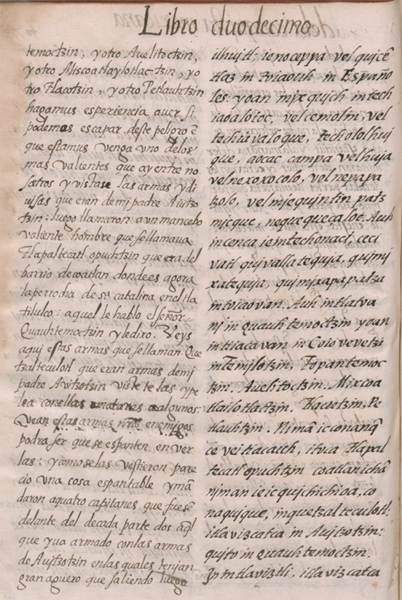 |
[Transcription of the Nahuatl (right-hand column) by James Lockhart:]
[f. 77v.] ilhuitl: ie no ceppa vel quicētlaz in toiaouh in Españoles: yoan in ixquich in techiaoalotoc, vel cemolin, vel techiavaloque, techololhuique, aocac campa vel huia vel nexoxocolo, vel nepapatzolo, vel miequintin patzmicque, nequequeçaloc. Auh in cenca ie intech onaci, ce civatl quivallatequia, quimixatequia, quimixapapatza in toiaovan.
Auh in tlatoani in Quauhtemoctzin yoan in tiiacavan in Coiovevetzi in Temilotzin, Topantemoctzin. Auelitoctzin. Mixcoatlailotlactzin. Tlacutzin, Petlauhtzin. Nimā ic conanq̄ ce vei tiacauh, itoca Tlapaltecatl opuch tzin coatlan ichā niman ie ic quichichioa, conaquique, in quetzalteculotl: itlaviz catca in Auitzotzin: quito in Quauhtemoctzin. Inin tlaviztli, itlaviz catca
|
[Translation of the Nahuatl (right-hand column) by James Lockhart:]
our enemies the Spaniards and all those who surrounded us attacked all together; they surrounded us entirely, herded us together. There was no place to go; people shoved, pressed, and trampled each other; many died in the press. But one woman came to very close quarters with our enemies, throwing water at them, throwing water in their faces, making it stream down their faces.
And then the ruler Quauhtemoctzin and the warriors Coyohuehuetzin, Temilotzin, Topantemoctzin, the Mixcoatlailotlac Ahuelitoctzin, Tlacotzin, and Petlauhtzin took a great warrior named Tlapaltecatl opochtzin, whose home was in Coatlan, and outfitted him, dressing him in a quetzal-owl costume. That had been the device of Ahuitzotl. Quauhtemoctzin said, “This was the device
[Translation of the Spanish (left-hand column) by James Lockhart:]
Tlacotzin, and another Petlauhtzin, "Let us make an experiment to see if we can escape this danger in which we find ourselves. Let one of the most valiant among us come and don the arms and insignia that belonged to my father Ahuitzotzin." Then they called a youth, a man of courage, called Tlapaltecatl Opochtzin, who was from the district of Coatlan in Tlatelolco, where the parish of Santa Catalina is now. The lord Quauhtemoctzin spoke to him, telling him, "You see here this warrior's costume, called a quetzaltecolotl, which was the costume of my father Ahuitzotzin. Put it on; fight in it, and you will kill some people. Let our enemies see this costume; it could be that they will be frightened by seeing it." When they dressed him in it, he appeared a frightening spectacle. They ordered four captains to go ahead of him, two on each side of the one in the costume of Ahuitzotzin, being very confident that with the power of the omen, when he appeared
|
[Translation of the Nahuatl into Spanish by Fr. Bernardino de Sahagún; transcription of the Spanish (left-hand column) by James Lockhart:]
[f. 77v.] temoctzin, y otro Auelitoctzin, y otro Miscoatlaylotlactzin, y otro Tlacotzin, y otro Petlauhtzin hagamus esperiencia a uer si podemos escapar deste peligro ē que estamus venga vno de los mas valientes que ay entre nosotros y vistase las armas y diuisas que eran de mi padre Auitzotzin: luego llamaron a vn mancebo valiente hombre que se llamaua Tlapaltecatl opuchtzin que era del barrio de coatlan donde es agora la perrocha* de sạ catalina en el tlatilulco: aquel le hablo el señor Quauhtemoctzin y le dixo. Veys aqui estas armas que se llaman Quetzalteculotl que eran armas de mi padre Avitzotzin vistetelas y pelea con ellas mataras algunos: vean estas armas n̄r̄os enemigos podra ser que se espanten en verlas: y como se las vestieron parecio vna cosa espantable y mādaron a quatro capitanes que fuesē delante del de cada parte dos aq̄l que yua armado con las armas de Auitzotzin en las quales tenian gran aguero que saliendo luego
----------
*PERROCHA. For "parrochia" (or other spellings, but all have a penultimate i).
|
